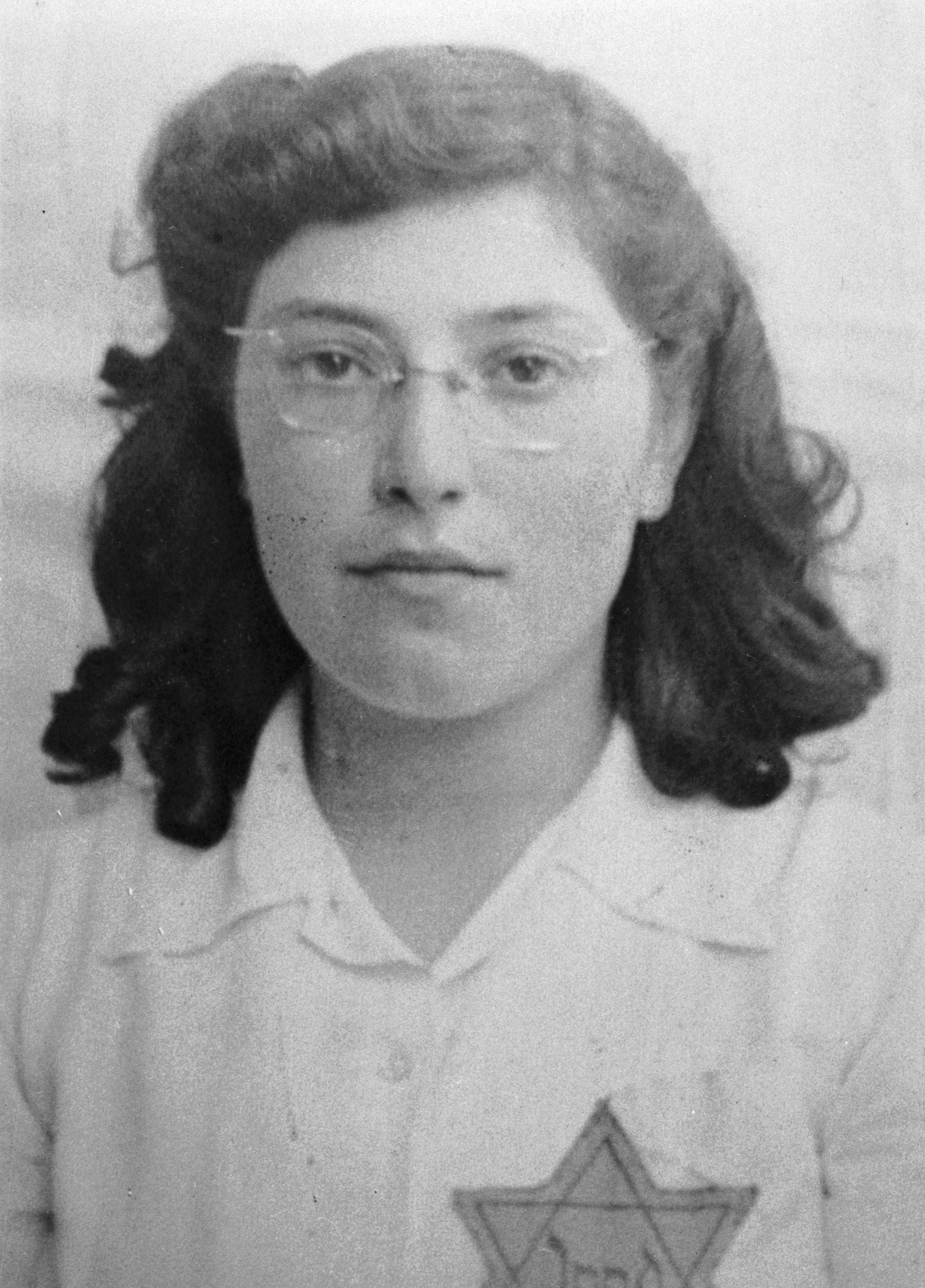Bloeme Evers - Emden
Bloeme Emden was a classmate of Margot's at the Jewish Lyceum. She met the Frank family in Westerbork and Auschwitz.
In Westerbork, the eight people in hiding met all sorts of people, both familiar and new, who after the war testified about their encounters with Anne, Margot, Edith, Otto, Peter, Hermann, Auguste and Fritz. One of them was Bloeme Emden, a former classmate of Margot.[1]
Bloeme Emden was born on 5 July 1926 in Amsterdam to a warm and politically aware family.[2] She had a six years younger sister Via Roosje Emden (1932-1943) and lived at Lutmastraat 194 II in Amsterdam.[3] Bloeme grew up in an almost entirely Jewish environment, although her parents were not religiously Jewish.
Anti-Jewish measures
In 1941, because of the anti-Jewish measures, Bloeme, like other Jewish pupils, had to go to the Jewish Lyceum. There she came into contact for the first time with Margot Frank, who was in her parallel class. Bloeme also remembered Anne Frank, but because of the age difference they did not get involved with each other much.[4]
In 1942, when the deportations started, the classes at the Jewish Lyceum became increasingly empty. In July 1942, Bloeme, like Margot Frank, received a summons to report for work in Germany.[5] Her father Emanuel Emden (1889-1943) was so desperate that he went to the Zentralstelle für Jüdische Auswanderung and arranged a sperre (temporary exemption) for his daughter.[2]
In May 1943 Bloeme was taken away from home and taken to the Hollandsche Schouwburg. She managed to avoid being registered and could escape by walking with the children to the crèche across the street and by running with the tram that blocked the view from the theatre. Through friends of her parents' she managed to go into hiding.
Imprisoned
After fifteen hiding places, she was arrested in August 1944 when the resistance group she was with was betrayed. Bloeme had been in hiding for a total of 15 months before she arrived in Westerbork, where she met the Frank family again.[6]
Just like the eight people in hiding in the Secret Annex, Bloeme was transported to Auschwitz concentration camp on 3 September 1944. There Bloeme ended up in the same barracks as Anne, Margot and Edith Frank.[2]
In the barracks Bloeme formed a group with thirteen Dutch women, including Lenie de Jong-van Naarden. The group was able to support each other and helped each other whenever possible. Anne, Margot and Edith Frank were also regular visitors and Bloeme remembered that the three of them were always together.[7]
Bloeme could still remember the last time she had seen the Frank family:
"There had been another selection. I spoke to Mrs. Frank with Margot; Anne was somewhere else, she had Krätze. (...) So Anne couldn't come with our group, and Mrs. Frank, seconded by Margot, said: 'And of course we're going with her.' I remember nodding, that I understood that. That was the last I saw of them."[8]
Bloeme, along with 50 other Dutch Jewish women, was transferred at the end of October 1944 to an Arbeitslager in Libau, Upper Silesia, where she had to perform forced labour.[9] The women worked six and a half days a week and were free on Sunday afternoons. Bloeme remembered that during those free hours, songs were sung that Rozette (Ronnie) van Cleef (1921-2008) wrote to opera and operetta melodies.[10]
They were liberated there on 8 May 1945: "on the first sunny day in May."[11]
Footnotes
- ^ Wikipedia: Bloeme Evers-Emden.
- a, b, c Anne Frank Stichting (AFS), Getuigenarchief, Interview Bloeme Evers-Emden, 11 maart 2010.
- ^ Stadsarchief Amsterdam, Dienst Bevolkingsregister, Archiefkaarten (toegangsnummer 30238): Archiefkaart Emanuel Emden.
- ^ Willy Lindwer, De laatste zeven maanden. Vrouwen in het spoor van Anne Frank, Hilversum: Gooi & Sticht, 1988, p. 130.
- ^ Anne Frank, Dagboek Dagboek A, 8 juli 1942, in: Verzameld werk, Amsterdam: Prometheus, 2013. Op zaterdag 4 juli 1942 verstuurde de Zentralstelle zulke oproepen aan duizend vooral Duitse en deels heel jonge Joden. Deze jongeren moeten zonder hun ouders vertrekken. L. de Jong, Het Koninkrijk der Nederlanden in de Tweede Wereldoorlog, Deel VI: juli '42 -Mei '43, eerste helft, 's-Gravenhage: Nijhoff, 1975, p. 5.
- ^ Lindwer, De laatste zeven maanden, p. 132-134.
- ^ Lindwer, De laatste zeven maanden, p. 143.
- ^ Lindwer, De laatste zeven maanden, p. 142-143.
- ^ Lindwer, De laatste zeven maanden, p. 138. Zie ook Smolinski Foundation: Krachtbronnen en Anne Frank.
- ^ Lindwer, De laatste zeven maanden, p. 139; AFS, Getuigenarchief. Interview Bloeme Everts-Emden, 11-maart 2010.
- ^ Bloeme was the only one of her family to survive the war. Lindwer, De laatste zeven maanden, p. 145.
